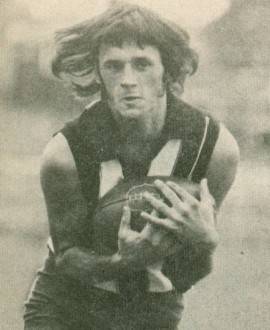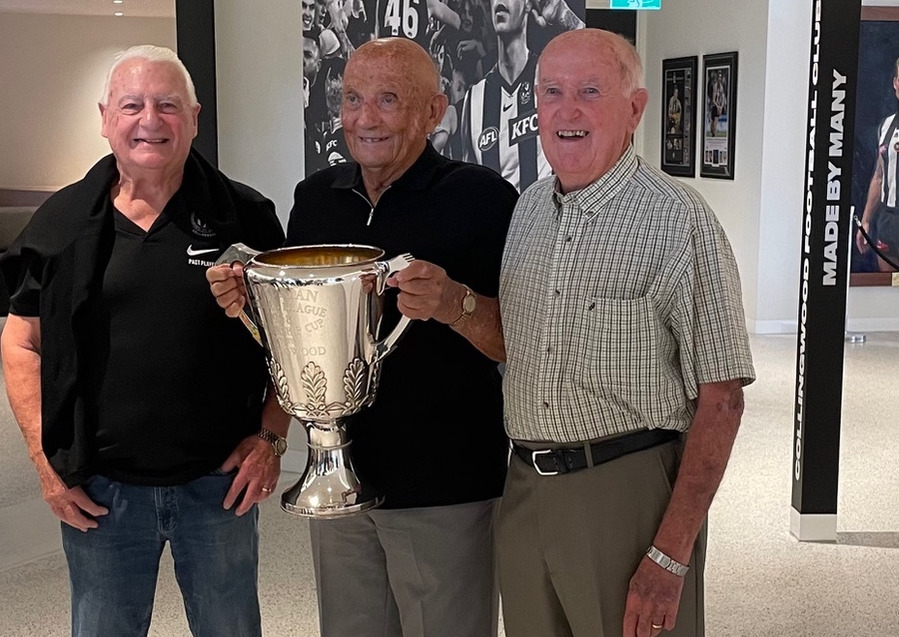

The controversial country zoning rules introduced by the VFL in 1968 ended up being something of disaster for Collingwood. Our country zones over the years produced far fewer stars than many of our competitors, leading to all sorts of questions about how the zones had been allocated and how fairly the system had been implemented.
But one zone we could never complain about was that in and around Terang. And if you need proof of that, just look at a 1971 team photo. There is Terang’s own Brian McKenzie, fresh from his appearance in the previous year’s Grand Final. There’s also a cheeky, fresh-faced kid called Ronnie Wearmouth, who would go on to be one of our great cult heroes.
Also there in ’71 is an even fresher-faced kid, who hailed from a tiny place called Ecklin South, just near Terang. He was Daryl Salmon, then about to embark upon a career that eventually tallied 56 games but could have been so much more.
By any measure, having three senior footballers from a town with a population then of about 2000 is good going. And Salmon knew exactly what he was heading into when he left Terang as a 17-year-old for Victoria Park in the summer of 1970-71.
The Salmons and McKenzies ran neighbouring dairy farms in Ecklin South, and Brian – seven years older – was something of a mentor figure for the youngster. Ronnie was a schoolmate at Terang High.
Daryl spent five years with South Ecklin U-16s before moving to the Terang U18s when he was 15. He played two seasons with them, including seven senior games, before Collingwood came calling. And next thing he knew he was on the train to Melbourne, where he was met at Spencer Street Station by club legend, then secretary, Jack Regan.
The whirlwind continued when Daryl, after just five reserves games, was named in the seniors to make his debut against Melbourne in Rd 6 at the MCG. The Magpies were suffering a defensive crisis, with no fewer than nine backmen unavailable – including McKenzie. Wearmouth had to be shoehorned into a back pocket. Salmon was brought in on a half-back flank.
It had been a meteoric rise, and it left the 17-year-old ‘shaking like a leaf’ on the day before, according to one newspaper. But he showed few signs of nerves that day at the ‘G. The Age named him among Collingwood’s best players and said the Magpies “should be very happy with the way he performed”. “He had the difficult job of holding ruck-rovers Graham Molloy and Peter Sinclair when they were resting on a half-forward flank and did it with the aplomb of a good footballer,” the paper wrote.
Daryl played his first five games in a row, then three more at the end of the season for a very promising debut campaign. Part of the reason he’d settled so well was the influence of coach Bob Rose, who Daryl respected massively not only as a coach but also as a human being. He had a huge influence on the young defender.
But Rose left at the end of the 1971 season, the last few weeks of which had been tumultuous for the Magpies. Daryl knew the club had lost someone special but continued to play at a high level himself, adding 19 games in 1972 and 23 in 1973, by which time he was an established part of the Magpie half-back line.
The Football Record said he had held down the half-back post “with distinction”. “He is a dashing type who can mark with the big men. He’s very lightly built but he has tremendous courage – one never sees him ‘pull out’ in a man-to-man tussle for the ball. He teams well with those around him … and usually clears the ball from the Collingwood half-back line with an attacking dash and kick. Unobtrusive on most occasions. He must have a fine future if his first 50 (games) are any indication.”
And that’s the way it looked. But 1974 was difficult. He managed just four games in the first eight weeks, and after being dropped was then a late withdrawal from the reserves team on the Saturday, with Jack Regan later telling reporters he didn’t know what had happened and that they hadn’t heard from him. That prompted a meeting with club officials during the week. And while Daryl returned for two more games later in the season, it's fair to say that relations between player and club were never quite the same again.
So at the end of 1974, Daryl Salmon turned around and headed home. It was his call. He had only just turned 21 and had 56 senior games to his name. It was easy to see him as a likely 200-gamer – one of those solid, dependable, no-fuss types who just did his job at a consistently high level every week. Instead he became something of a legend in the Hampden League, leading Warrnambool to three successive Premierships between 1977 and 1979. But it’s hard to escape the feeling he should still have been plying his trade at the MCG and Victoria Park instead.
- Michael Roberts
CFC Career Stats
| Season played | Games | Goals | Finals | Win % |
|---|---|---|---|---|
| 1971-1974 | 56 | 0 | 3 | 71.4% |
CFC Season by Season Stats
| Season | GP | GL | B | K | H | T | D | Guernsey No. | ||
|---|---|---|---|---|---|---|---|---|---|---|
Other CFC Games
| Team | League | Years Played | Games | Goals |
|---|---|---|---|---|
| Collingwood | Reserves | 1971 - 1974 | 28 | 0 |






